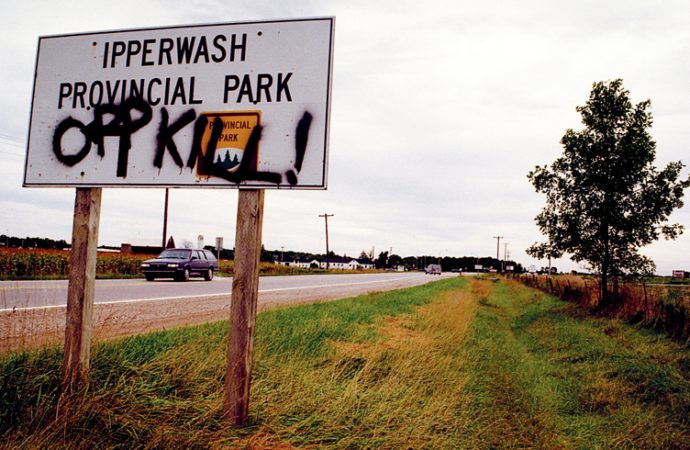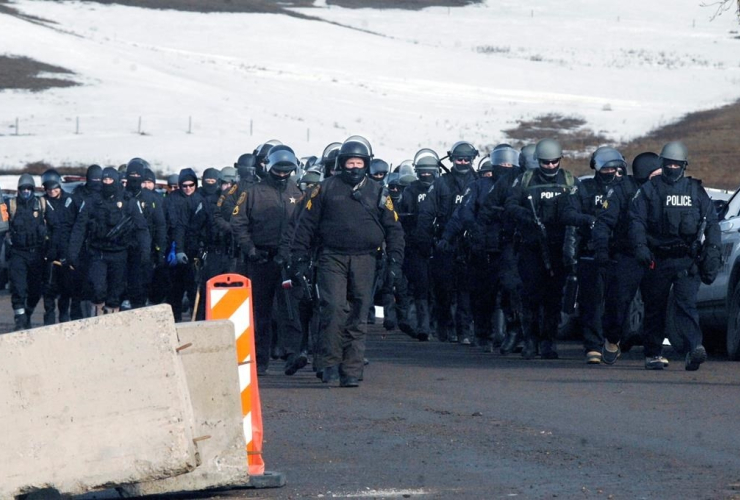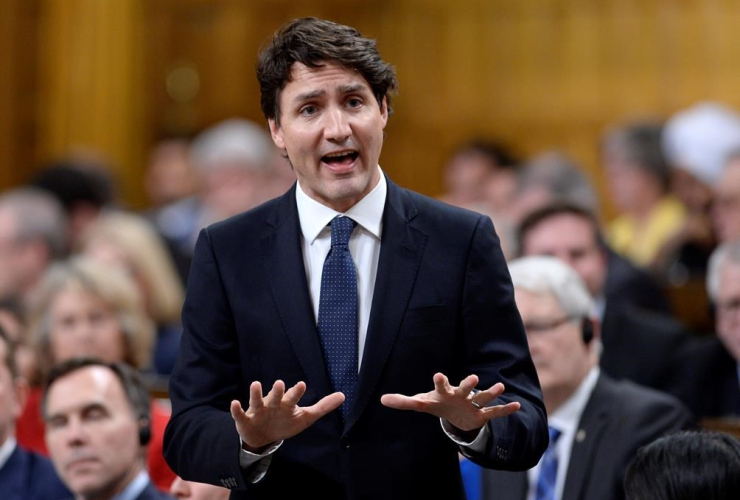A false and frightening narrative is emerging from the band of politicians, fossil executives and commentators determined to see the Trans Mountain pipeline expansion built at any cost.
They’ve gone into overdrive to spin the massive, overwhelmingly peaceful civil disobedience at the Kinder Morgan construction site on Burnaby Mountain as violent and extreme. And now, former Bank of Canada governor David Dodge is essentially asserting that if a few people die in the protests, that’s the price the country will have to pay to get essential infrastructure built.
The fevered rhetoric coming from Trans Mountain boosters is dangerous. It’s provocative. And it bears no relationship to the facts on the ground.
Do whatever it takes
Dodge, routinely profiled as a “plain-spoken” proponent of “economic reason” who “is not inclined to hold his tongue,” was on a roll at an event in Edmonton last week.
“We’re going to have some very unpleasant circumstances. There are some people that are going to die in protesting construction of this pipeline. We have to understand that,” he said.
“We have seen it other places, that equivalent of religious zeal leading to flouting of the law in a way that could lead to death,” he added. “Inevitably, when you get that fanaticism, if you will, you’re going to have trouble,” due to what the Edmonton Journal called “the extremist minority among pipeline foes.”
Dodge may have been the worst, but he wasn’t the first. The new narrative first emerged on CBC’s The Current May 30, the day after Finance Minister Bill Morneau announced that Canadians were about to become involuntary owners of a troubled, 65-year-old pipeline. MP Pierre Poilievre (CPC, Nepean-Carleton), who first earned his reputation for exaggeration as a Harper-era cabinet minister, repeatedly referred to “violent lawbreaking protesters” in demanding the Trudeau government clamp down on the Burnaby Mountain blockade.
No truth to the narrative
“Those lawbreakers should be treated like lawbreakers,” he told host Anna Maria Tremonti, “and the Prime Minister ought to have signaled that to law enforcement.”
The problem for Polievre is that, almost without exception, the Burnaby Mountain protests have been intense but non-violent. Afterwards, Tremonti took criticism for letting her guest get away with it.
“@PierrePoilievre keeps talking about ‘violent’ protest but doesn’t give examples of harm to people or property,” tweeted @tygermelon. “He is intentionally misleading. So far, all I see is non-violent civil disobedience which falls within the realm of peaceful protest.”
“Anna-Maria, very unimpressed that you allowed @PierrePoilievre to repeatedly lie about non-existent ‘violent’ protests and the extensive spill history of #TransMountain,” agreed @michaelcozens. “You failed as a journalist today. Please return to your usual level of quality.”
Who’s calling whom an extremist?
Here's one question that Dodge and Poilievre might have trouble answering: As the push and pull over Trans Mountain moves into a long, hot summer, who are the extremists?
Is it a corporate descendent of the scandal-ridden Enron empire laying down an extraordinary ultimatum to three democratically-elected governments? A pundit who says pipeline opponents should be hanged for treason and offers to buy off provincial MLAs to get them to support the project? Or a municipality trying to enforce its own bylaws?
Is it a community of peaceful protesters, First Nations and municipalities, scientists and economists, millennials and seniors, all of them diligently building the evidence base against the pipeline, looking out for the safety of a large university campus located next to an expanding tank farm, applying the climate test the federal government says it wants, and following the facts to their logical conclusion? Or a Houston-based pipeliner widely accused of misrepresenting its past safety record, distorting regulatory evidence to avoid a costly route change, and even overstating the number of jobs its construction project will produce?

Is it peaceful protesters exercising their democratic right to fight the pipeline through non-violent civil disobedience? Or an industry hell-bent on ginning up consumption of a product that fries the atmosphere and makes the Earth uninhabitable when used as directed?
Is it a clean energy sector poised to deliver thousands of stable, green jobs in energy efficiency and renewable energy? Or a declining industry that is satisfied to subject Alberta to the continuing boom-and-bust job cycle of a fraught fossil economy, while doing its best to reduce its work force through the bizarrely-named process of de-manning?
Is it an established, supposedly self-sufficient fossil industry that shamelessly draws $3.3 billion per year in subsidies from Canadian government coffers — or above $46 billion according to an International Monetary Fund methodology that put global subsidies at an unfathomable $10 million per minute in 2015? Or taxpayers who expected the Trudeau government to invest something close to that $3.3 billion to put an end to boil water advisories in First Nations communities, as the Prime Minister instructed Minister of Indigenous Services Jane Philpott to do in her October, 2017 mandate letter?
And finally, who’s the real extremist: A protester like Simon Fraser University biochemist Lynn Quarmby who, early in the fight for Burnaby Mountain, declared that “I’m going to turn around and walk up this hill and be the best citizen I can be”? Or a former senior federal official who uses his position as a public opinion leader to casually write off the lives of earnest, deeply concerned Canadian citizens?
Narratives set the political space
Dodge and Poilievre stepped up to deliver the new storyline Trans Mountain’s backers needed to sell the government’s astonishing decision to nationalize a pipeline that Kinder Morgan no longer wanted.
They knew that, when the going gets tough, narratives matter. They determine the political space to address issues ranging from energy choices to climate strategy, job development to First Nations health. The wrong narrative sets the wrong boundaries around that political space.
The best recent example was not even the Kinder Morgan buyout, but the fate of an innocuous attempt by the federal government to decarbonize the Centennial Flame.
The Flame is located at the entrance to Parliament, and since 1967 it’s been a much-photographed highlight of any tourist’s visit to the Hill. For bonus points, you can breathe in your own, personal hit of methane whenever you walk by. (On the scale of things, its greenhouse gas impact is vanishingly small.)
For some time, the government has been offsetting the Flame’s emissions by buying “green natural gas” from Toronto-based Bullfrog Power. But then Public Services and Procurement Canada (PSPC) came up with the sensible idea of truly decarbonizing the Flame, possibly by replacing it with LED lights.
The Canadian Gas Association went to war. It said PSPC was attacking a bedrock symbol of Canadian unity that represents the flow of an essential natural resource from west to east.
It only took two weeks for the government to withdraw the proposal.
If we can’t get organized to decarbonize the Centennial Flame, why are we surprised when the government admits that it’s falling far short of a Paris Agreement target originally introduced by the Stephen Harper regime, that both Trudeau and Environment Minister Catherine McKenna have declared a floor, not a ceiling, for Canada’s climate ambition?
Or that independent analysis puts the actual gap somewhere north of 100 megatonnes?
And back to our question for David Dodge: If this is where our public narrative on pipelines and energy, climate and carbon has brought us, who are the real extremists?
Former Bank of Canada
Former Bank of Canada governor David Dodge: “We’re going to have some very unpleasant circumstances. There are some people that are going to die in protesting construction of this pipeline. We have to understand that.”
UNDERSTAND that protesters will be killed.
ACCEPT that protesters will be killed.
ALLOW protesters to be killed.
Call it SOCIAL LICENCE.
Pipeline protestors and land protectors are marching together.
David Dodge, Justin Trudeau, and Rachel Notley are out of step with the times.
They — not pipeline protestors and land protectors — are the extremists.
Don't arrest land protectors for blocking pipelines.
Arrest Dodge, Trudeau, and Notley for putting up roadblocks to our sustainable future, obstructing progress, and endangering present and future generations.
Mark Carney, Bank of Canada
Mark Carney, Bank of Canada governor (2008 – 2013):
“The challenges currently posed by climate change pale in significance compared with what might come. Once climate change becomes a defining issue for financial stability, it may already be too late.”
“If that estimate is even approximately correct it would render the vast majority of reserves ‘stranded’ — oil, gas and coal that will be literally unburnable without expensive carbon capture technology, which itself alters fossil fuel economics.
“While there is still time to act, the window of opportunity is finite and shrinking.”
("A Transition in Thinking and Action", 29 September 2015)
"Climate change is a tragedy of the horizon which imposes a cost on future generations that the current one has no direct incentive to fix. The catastrophic impacts of climate change will be felt beyond the traditional horizons of most actors. Once climate change becomes a clear and present danger to financial stability it may already be too late to stabilise the atmosphere at two degrees.
"The tragedy of the horizon can be resolved in an orderly, effective and productive manner, however, with early transitions in thinking and action.
"…Financing the transition to a low carbon economy is a major opportunity for investors and creditors. It implies a sweeping technological revolution, including investments in long-term infrastructure at roughly quadruple the current rate.
("A Transition in Thinking and Action", 6 April 2018)
Dodge's language is that of
Dodge's language is that of the classic domestic (or, really, any) abuser: "Look what you made me do."
Dear Law Enforcement:
Dear Law Enforcement:
Don't let the likes of David Dodge and his wealthy corporate cronies manipulate you into even thinking about hurting or killing your fellow Canadians who are peacefully protesting the further construction of pipelines. I know from experience that it will be you who are blamed, you who will take the fall, you who will have the nightmares, and you who will carry the guilt should any protesters be harmed. The elite will simply walk away whistling and pocketing even more millions. You are tasked with enforcing the law, yes, but don't telescope your batons and leave your more deadly weapons holstered.
Yours,
Pat Carl
Retired US Customs and Border Protection Officer
I REALLY appreciate the
I REALLY appreciate the clarity and sanity of this report... and the willingness to illuminate logic that has embedded within it a corrupt and false premise - (ie: it's inevitable that killing some people is going to be part of doing business when there are resistors) - and contrast that with an uncontaminated view of the issue.
People need to learn to discriminate these days when everything has become so fuzzy.... But the clarity that we need engages the heart and mind together - the mind separated from the heart is easily convinced that illogic is truth.




Comments